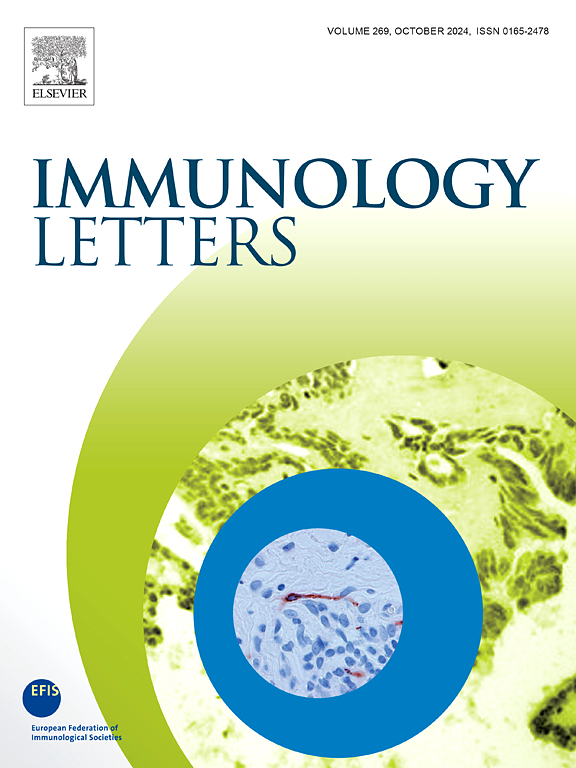瑞德西韦减轻胶原诱导关节炎的关节损伤,抑制RA滑膜成纤维细胞的炎症细胞死亡。
IF 2.8
4区 医学
Q3 IMMUNOLOGY
引用次数: 0
摘要
背景:瑞德西韦是一种腺苷类似物,目前也用于抗冠状病毒2019。瑞德西韦还具有抗炎作用,可减少促炎细胞因子的产生,抑制环GMP-AMP合成酶- sting途径。方法:我们在高脂饮食(HFD)胶原诱导关节炎(CIA)小鼠模型和RA患者成纤维细胞样滑膜细胞中评估瑞德西韦的抗关节炎作用。给DBA/1J小鼠注射II型胶原诱导CIA。每周皮下注射三次载药或瑞德西韦。在7周的治疗期间,每周2次评估关节炎评分和发病率。流式细胞术和共聚焦成像检测脾脏CD4 + T细胞。用瑞德西韦和肿瘤坏死因子(TNF)-α体外刺激RA患者的FLSs,并采用western blotting检测STING和坏死相关标志物的表达。结果:瑞德西韦可抑制CIA小鼠关节炎的发生和进展。组织学分析显示,瑞德西韦治疗组的炎症和软骨损伤评分低于对照组。白介素(IL)-17 + CD4 + t细胞分化在瑞德西韦治疗组受到抑制。此外,瑞德西韦组IL-17/-6/-1β、单核细胞趋化蛋白-1和TNF-α的表达降低。在体外,瑞德西韦抑制TNF-α刺激下ra - fls中STING、核因子-κB、RIPK3和磷酸化MLKL的表达。结论:抗病毒药物瑞德西韦通过调节Th细胞分化、促炎细胞因子表达、STING通路和坏死下垂抑制关节炎。本文章由计算机程序翻译,如有差异,请以英文原文为准。
Remdesivir alleviates joint damage in collagen-induced arthritis and inhibits inflammatory cell death of RA synovial fibroblasts
Background
The antiviral agent, remdesivir, is adenosine analogue which is currently also used as anti-coronavirus disease 2019. Remdesivir also had anti-inflammatory effect which reduced pro-inflammatory cytokine production, and inhibition of the cyclic GMP-AMP synthase–STING pathway.
Methods
We evaluated the antiarthritic effects of remdesivir in a mouse model of High-fat diet (HFD) collagen-induced arthritis (CIA) and in fibroblast-like synoviocytes from patients with RA. Type II collagen was administered to DBA/1J mice to induce CIA. Vehicle or remdesivir was injected subcutaneously three times a week. During 7 weeks of treatment, the arthritis score and incidence were evaluated twice a week. Flow cytometry and confocal imaging were used to evaluate CD4 + T cells in the spleen. FLSs from patients with RA were stimulated in vitro with remdesivir and tumor necrosis factor (TNF)-α, and western blotting was used to measure the expression of STING and necroptosis-related markers.
Results
Remdesivir administration suppressed the incidence and progression of arthritis in mice with CIA. Histological analysis revealed lower inflammation and cartilage damage scores in remdesivir-treated than in vehicle groups. Interleukin (IL)-17 + CD4 + T-cell differentiation was inhibited in the remdesivir-treated group. Furthermore, IL-17/-6/-1β, monocyte chemoattractant protein -1, and TNF-α expression was reduced in the remdesivir group. In vitro, remdesivir suppressed the expression of STING, nuclear factor-κB, RIPK3, and phosphorylated MLKL in RA–FLSs under TNF-α stimulation.
Conclusions
The antiviral agent remdesivir suppressed arthritis by regulating Th cell differentiation, pro-inflammatory cytokine expression, the STING pathway, and necroptosis.
求助全文
通过发布文献求助,成功后即可免费获取论文全文。
去求助
来源期刊

Immunology letters
医学-免疫学
CiteScore
7.60
自引率
0.00%
发文量
86
审稿时长
44 days
期刊介绍:
Immunology Letters provides a vehicle for the speedy publication of experimental papers, (mini)Reviews and Letters to the Editor addressing all aspects of molecular and cellular immunology. The essential criteria for publication will be clarity, experimental soundness and novelty. Results contradictory to current accepted thinking or ideas divergent from actual dogmas will be considered for publication provided that they are based on solid experimental findings.
Preference will be given to papers of immediate importance to other investigators, either by their experimental data, new ideas or new methodology. Scientific correspondence to the Editor-in-Chief related to the published papers may also be accepted provided that they are short and scientifically relevant to the papers mentioned, in order to provide a continuing forum for discussion.
 求助内容:
求助内容: 应助结果提醒方式:
应助结果提醒方式:


